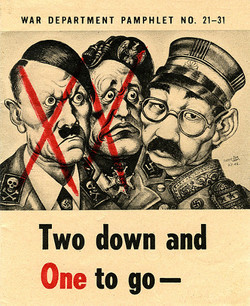New approaches to fascism

From intellectual circles to unbounded genocide
Since the 1920s scholars have studied fascism—a phenomenon that would rapidly plunge the world into ruin. Now, almost one hundred years and numerous phases later, research on fascism has once again taken new directions.
Sven Reichardt thinks that recent research approaches offer a significant opportunity to examine more precisely the procedural character of fascism. He proposes a division into seven developmental stages, which are intended to make better visible the process from “small intellectual circles” up to “totally unbounded genocidal policies.” This also allows a more precise comparison of different fascist movements than previous models had.
It is significant, the historian argues, that such a proceduralization provides the basis for new interpretations—something that was almost impossible with the long predominant approach to fascism as a static phenomenon with set characteristics. As an important developmental marker Reichardt identifies the “fascist warfare” of the imperial policies of Germany, Italy, and Japan, which as latecomers radicalized the imperialism of the nineteenth century by transcending its hierarchical thinking through exterminatory policies.
Focusing on global entanglements
Sven Reichardt also sees potential for new insights in a second trend: In recent years there have been more publications oriented around global history. Current research focuses more frequently on the transnational entanglements of fascist regimes.
Contemporary scholars had initially investigated fascism as the “result and final stage of capitalism.” Later it was viewed through the lens of totalitarianism theory, until the 1990s when fascist ideology and culture were primarily examined.
“Perhaps we are observing the beginning of a new wave of research that attempts to transfer global-historical perspectives onto fascism. In this way, perspectives of entanglement, transnational history, as well as different mutual influences and competitive relationships among regimes become the focus,” the historian says.
What does this do?
What intellectual insights do these new approaches offer? They expand the perspectives, according to Reichardt.
“Then we recognize that we are dealing here not only with [Nazi] Germany, but with an empire that has to arrange itself with numerous other states.”
Reichardt illustrates this with the example of Nazi settlement policies. In the course of planning for the period after the Second World War, the Nazis learned early from Italy and Japan how the expected settlement territory in Eastern Europe could be shaped. Mussolini’s regime had already demonstrated this in Libya and also in part in Abessinia (today Ethiopia) during the mid-1930s: racially-separated new cities, a massive expansion of the economy and infrastructure to provide for Italian settlers, along with the establishment of concentration camps. Japan’s occupation practices in Manchukuo, which was conquered in 1932, were similar.
This approach opens up new interpretive spaces for research. In order to write social history, Reichardt argues, a transnational, global horizon is indispensable.
There are, however, methodological hurdles to such research: If we adopt a praxiological perspective, for example, about the informal exchange among actors, we have to read the archival traces of nation-state institutions across several countries. Furthermore this requires mastering not only widespread European languages, but also various non-European languages. Reichardt thus sees international group research as a way forward.
Testing grounds for new research contexts
This brings us to the parameters of Reichardt’s own research. Reichardt was able to collaborate with historian Victoria de Grazia (Columbia University, New York) during his fellowship and her residence as a visiting scholar at the Institute for Advanced Study Konstanz in 2016–2017. In the early summer of 2017 the pair organized two conferences there with participants from thirteen countries focusing on the global entanglements of the Axis Powers and their mediating actors.
Reichardt emphasizes how important such an institutional site is for becoming acquainted with different methodological approaches, issues, and perspectives, that is, for testing out joint research. The cooperation was very fruitful: together with Victoria de Grazia, Sven Reichardt is currently preparing a research proposal for the European Research Council. Thus research on fascism, even one hundred years after its inception, still has a future.
Prof. Sven Reichardt teaches contemporary history at the University of Konstanz. He is a key participant in the Center of Excellence “Cultural Foundations of Social Integration” and co-director of the PhD Program “Europe in the Globalized World.” In 2016 he was a visiting professor at the New School for Social Research and in 2016–2017 a fellow at the Institute for Advanced Study Konstanz.
Further readings
Sven Reichardt: Globalgeschichte des Faschismus. Neue Forschungen und Perspektiven. In: (Anti-)Faschismus, Aus Politik und Zeitgeschichte (APuZ), vol. 67, 42-43 (2017), p. 10-16. text
Sven Reichardt: Faschistische Kampfbünde. Gewalt und Gemeinschaft im italienischen Squadrismus und in der deutschen SA. Köln: Böhlau 2009².
Arnd Bauerkämper and Grzegorz Rossoliński-Liebe (ed.): Fascism without Borders. Transnational Connections and Cooperation between Movements and Regimes in Europe, 1918–1945. Berghahn 2017.
Fernando Esposito: Faschismus – Begriff und Theorien (Version: 1.0). In: Docupedia-Zeitgeschichte, 2016. text
